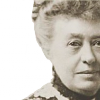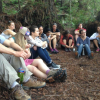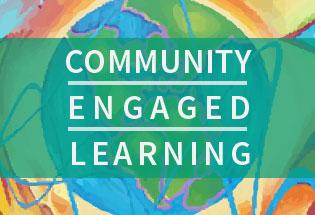What is Community Engaged Learning?
Community Engaged Learning (CEL) is a course, internship, or program that includes...
-
an engagement with a community that addresses societal needs not currently being met by governments, markets, or the independent sector
-
intentional integration of learning objectives and experience with/in the community
-
student preparation and ongoing reflection and/or critical analysis
-
reciprocal benefits for students, community, and campus partners
-
opportunities to critically examine public issues and/or explore one's civic identity
Who we are and what we do
The Community Engaged Learning team is a partnership between the Haas Center for Public Service and the Vice Provost of Undergraduate Education. We also work closely with many departments and programs across campus, such as the Center for Comparative Studies in Race and Ethnicity, Education, HumBio, Earth Systems, the Office of Community Health, Public History, Urban Studies, among many others.
The Community Engaged Learning team is available to support faculty throughout the teaching process—from course design through evaluation.
SEE EXAMPLES OF COMMUNITY ENGAGED LEARNING COURSES
Why teach a Community Engaged Learning class?
 "The University was accordingly designed for the betterment of mankind morally, spiritually, intellectually, physically, and materially. The public at large, and not alone the comparatively few students who can attend the University, are the chief and ultimate beneficiaries of the foundation. While the instruction offered must be such as will qualify students for personal success and direct usefulness in life, they should understand that it is offered in the hope and trust that they will become thereby of greater service to the public."
"The University was accordingly designed for the betterment of mankind morally, spiritually, intellectually, physically, and materially. The public at large, and not alone the comparatively few students who can attend the University, are the chief and ultimate beneficiaries of the foundation. While the instruction offered must be such as will qualify students for personal success and direct usefulness in life, they should understand that it is offered in the hope and trust that they will become thereby of greater service to the public."
Jane Stanford, Address to the University Trustees
October 1, 1902
Community Engaged Learning in the news
 The CEL program and similar undertakings have been featured in the Stanford Magazine (May/June 2014), the Stanford Report (February 2014), and the Graduate School of Education newsletter (Aug 2014). If you are interested in publishing about your class, let us know.
The CEL program and similar undertakings have been featured in the Stanford Magazine (May/June 2014), the Stanford Report (February 2014), and the Graduate School of Education newsletter (Aug 2014). If you are interested in publishing about your class, let us know.
Developing a Community Engaged Course
Identify and reach out to relevant community partners
Develop student placements or projects in conjunction with the community partner
Clarify student and partner roles and expectations
Prepare students for community experience
Communicate with partners and students throughout the course
Facilitate student reflection and intentional linkage of learning objectives with service experience
Measure impact
Coordinate capstone events
Maintain community partnership beyond the academic quarter
To schedule a consultation about your course, or to become a mentor for a new faculty member engaging in CEL, please email learningincommunity@lists.stanford.edu.
Fund your community engaged learning class
The Haas Center for Public Service and VPUE partner to provide funding for community-engaged learning classes. Course grants are ideal to cover the additional costs of teaching a community engaged learning course, including student transportation, community partner honoraria and/or supplies, and other expenses. Course grant applications are accepted on a rolling deadline.
If your course has previously received a course grant and you would like to apply for a renewal of funding, please fill out the below form.
Join the community
To join our email list, please contact our Program Manager, Nathaniel Berger.
To join our Community of Practice (monthly face-to-face meetings with other CEL practictioners), please contact Sarah Truebe.
Review example Community Engaged Learning syllabi
Anthropology
ANTHRO 112: Public Archaeology: Market Street Chinatown Archaeology Project (ANTHRO 212, ANAMST 112)
Center for Comparative Studies of Race and Ethnicity
CSRE 146S: Asian American Culture and Community (AMSTUD 146, ANAMST 146S, COMPLIT 146)
CSRE 203A: The Changing Face of America: Building Leaders for Civil Rights and Education (also featured on our examples page)
Earth Systems
EARTHSYS 127: GIS for Good: Applications of GIS for International Development and Humanitarian Assistance (EESS 122, EESS 222) (also featured on our examples page)
Education
EDUC 103B: Race, Ethnicity and Linguistic Diversity in Classrooms: Sociocultural Theory and Practices (AFRICAAM 106, CSRE 103B, EDUC 337) (also featured on our examples page)
EDUC 183X: Practicum in English-Spanish School and Community Interpreting (CHILAST 183X, EDUC 283X)
EDUC 322: Community-based Research as a Tool for Social Change: Discourses of Equity in Communities & Classrooms (AFRICAAM 130, CSRE 130, EDUC 123X) (also featured on our examples page)
Feminist, Gender and Sexuality Studies
FEMGEN 138: Violence Against Women: Theory, Issues and Prevention (FEMGEN 238, HUMBIO 178V)
History
HISTORY 166B: Immigration Debates in America, Past and Present (CSRE 166B, HISTORY 366B)
Human Biology
International Relations
Medicine
MED 157: Foundations for Community Health Engagement
MED 158: Hunger and Nutrition in the Bay Area
Religious Studies
RELIGST 162: Sprituality and Nonviolent Urban and Social Transformation (CSRE 162A, URBANST 126)
RELIGST 188A: Issues in Liberation: El Salvador
Theater and Performance Studies
TAPS 13SC: Journeying In and Out: Creative Writing and Performance in Prisons
Urban Studies
URBANST 145: International Urbanization Seminar: China (EARTHSYS 138, IPS 274)
URBANST 164: Sustainable Cities
For more information about these or other CEL courses, email learningincommunity@lists.stanford.edu.
Have a class to tag on Explore Courses?
The CEL team tags classes on Explore Courses so interested students can search specifically for community engaged learning (or service-learning). Please send a copy of your most up-to-date syllabus to learningincommunity@lists.stanford.edu to see if your class qualifies. We try to respond to requests within two weeks.
Resources
- Campus Compact Resources
- Campus-Community Partnerships for Health Toolkits
- Designing Community-Based Courses (Public Service Center, UC Berkeley)
- National Service Learning Clearinghouse
- Resources for Review, Tenure and Promotion (Community-Engaged Scholarship for Health Collaborative)
- Research University Engaged Scholarship Toolkit








